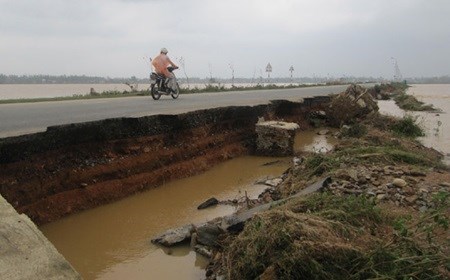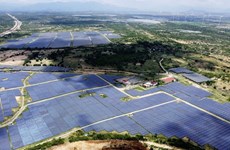River basins in need of tighter management
Scientists, researchers and officials from Quang Nam province and Da Nang city on November 21 discussed the management of the Vu Gia-Thu Bon river basin in the Quang Nam-Da Nang coastal area.
 Flood damage on a section of road near Da Nang (Source: VNA)
Flood damage on a section of road near Da Nang (Source: VNA)The Vu Gia-Thu Bon basin, the 9th largest in Vietnam with 10,350sq.km, discharges more than 20.22 billion cubic metres a day and is home to 2.5 million people.
However, the operations of 42 hydropower plants, 79 reservoirs, 358 dams and 147 pumping stations are causing serious problems for State agencies in terms of balancing economic growth and environmental protection.
Vietnam ranked 102nd on a list of 124 nations with the most polluted water resources in the world. Eighty percent of pollution comes from river basins and solid waste from the mainland.
The country would face clean water shortage by 2025 with an estimated of 2,800 cubic metres per person per year, lower than the world standard of 4,000 cubic metre, said Deputy Head of the Party Central Committee's Office Nguyen Van Thanh at a meeting in Hoi An.
"We should raise awareness on how to balance and solve conflicts between economic growth and nature. In Vietnam, we often reserve power for development first, and ultimately have to repair the damage we cause to meet economic growth targets," Thanh said.
Nguyen Chu Hoi, a researcher on the environment and coastal resources at the National University, said the destruction of riverhead forests, over-exploitation of mineral resources, decentralised management of rivers and faulty development of hydropower plants had caused serious floods, epidemics at aquaculture centres and mass losses of marine life.
The boom in hydropower plants along the Vu Gia-Thu Bon river has helped to meet Vietnam's growing energy demand, but has caused serious environmental and social impacts.
The latest report showed that more than 30 percent of water in the river system is impounded due to the large number of dams.
Huynh Van Thang, Deputy Director of Da Nang's Agriculture and Rural Development Department, blamed the operations of hydropower plants on upstream rivers for the lack of clean water due to the salinity in Da Nang.
"The operation of reservoirs belonging to hydropower plants in the upstream Vu Gia-Thu Bon river system during the dry season has yet to take into account the demand for clean water from the river basin for residents and farmers," he said.
Jake Brunner from the International Union for Conservation of Nature said the Vu Gia-Thu Bon river basin had short and steep watersheds with highly seasonal flow, and generated large volumes of sediment that had direct and immediate impacts on the downstream environment.
In 2012, the Quang Nam People's Committee decided to stop the development of two hydropower plants and suspend the construction of 17 others after delays led to problems and mounting frustration in the area.-VNA













